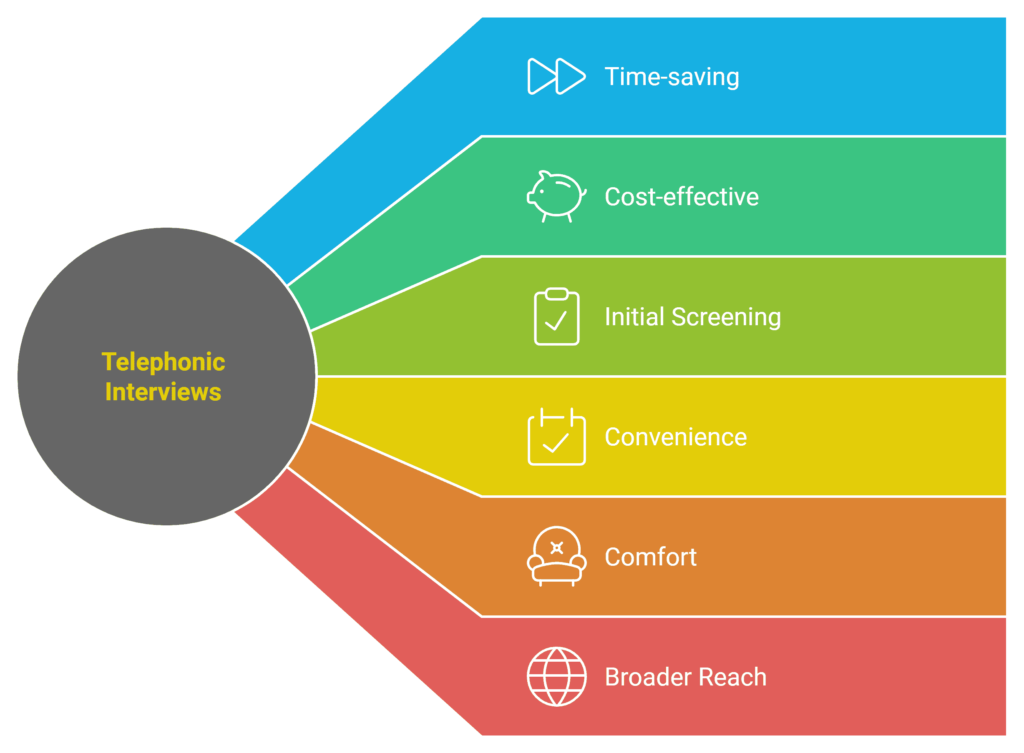A telephonic interview is often the first step in the recruitment process and can make or break your chances of moving to the next stage. Whether you’re a fresher looking for your first job or an experienced candidate aiming for a senior position, understanding the nuances of a telephonic interview is essential to stand out from other applicants.
In this post, we’ll explore everything you need to know about telephonic interviews—from what to expect and how to prepare, to essential tips, sample question answers, and even some bonus questions to help you succeed.
What Do You Mean by a Telephonic Interview
A telephonic interview is a recruitment method where a potential employer interviews over the phone. It typically serves as a first-round screening or preliminary evaluation of candidates before inviting them for an in-person interview. Telephonic interviews have become increasingly popular due to their convenience, especially in today’s remote working culture.
Unlike face-to-face interviews, telephonic interviews focus on assessing a candidate’s communication skills, self-confidence, technical knowledge, and personality over the phone. It is common for employers to use telephonic interviews to filter out candidates and move forward with only those who meet their basic qualifications.
Why Are Telephonic Interviews Used?
- Time-saving: Employers can quickly gauge if a candidate is fit for the role without spending time on a face-to-face interview.
- Cost-effective: Telephonic interviews eliminate the need for travel, which can be especially beneficial for out-of-town or international candidates.
- Initial Screening: It allows recruiters to check a candidate’s qualifications, personality, and communication style before investing more time in a face-to-face meeting.
Benefits of Telephonic Interviews

- Convenience: Both parties can schedule the interview without the need for travel or physical presence.
- Comfort: Candidates can be in a comfortable setting, often at home, which may reduce stress.
- Broader Reach: Employers can reach candidates globally, making it easier to expand the talent pool.
What to Expect in a Telephonic Interview
Telephonic interviews vary in format depending on the company and role, but there are certain things you can always expect. Here’s a breakdown:
1. Introduction and Icebreakers
At the beginning of the interview, the recruiter will typically introduce themselves and provide a brief overview of the job and the company. They generally ask you questions like “Brief me about yourself,” which are meant to start and pace the conversation.
2. Role-Specific Questions
Expect a range of technical and behavioral-based interview questions tailored to the specific position you’re applying for. For a developer role, for example, you might be asked questions about programming languages or frameworks. For content marketing roles, you might face questions related to writing styles, SEO knowledge, and experience.
3. Behavioral and Situational Questions
Employers may ask about past experiences to gauge how you handle challenges, deadlines, and team collaboration. You may hear questions like, “Tell me about a time when you had to handle a difficult situation at work?”
4. Time for Your Questions
At the end of the interview, you’ll likely be asked, “Do you have any questions for me?” This is an added advantage for you to know more about the company culture, job responsibilities, and team dynamics.
5. Clarification on Next Steps
Before wrapping up, the recruiter will explain the next steps in the interview process, such as whether they will be scheduling a second interview, performing a technical assessment, or notifying you about their decision.
Telephonic Interview Tips and Strategies
To help you ace your telephonic interview, here are 10 essential tips and strategies:

1. Prepare for Common Interview Questions
Answer: Make yourself familiar with common interview questions, such as “Brief me about yourself,” “Why do you want to work in our company?” and “What are your strengths and weaknesses?” Have answers ready but avoid sounding robotic. Make your responses engaging and reflective of your personality.
2. Research the Company
Answer: Knowing the company’s background, products, services, and culture is essential. It shows that you’ve done your homework and are genuinely interested in the role. This also allows you to adapt to your answers and ask genuine questions.
3. Test Your Phone and Connection
Answer: Make sure your phone is fully charged and that you have a clear connection. Find a quiet space free from distractions, such as background noise or interruptions, to ensure the interview goes smoothly.
4. Use a Professional Tone
Answer: Since the recruiter can’t see you, your voice and tone are extremely important. Speak, slowly, and confidently. Avoid speaking too quickly or sounding too casual. Remember, you have to make a good impression with your communication skills and self-confidence.
5. Be Ready for Technical Questions (If Applicable)
Answer: For technical roles, such as a front-end developer or content writer, be ready to answer specific technical questions. Brush up on relevant terminology, tools, and industry practices. If needed, review coding problems, SEO tactics, or writing techniques you might be asked about.
6. Listen Carefully
Answer: Don’t interrupt the interviewer. Listen question with full attention, and take a moment to organize your thoughts before answering. This ensures your answers are clear and to the point.
7. Keep Your Resume Handy
Answer: You must have a copy of your resume during the interview. This helps you quickly reference your qualifications, past experiences, and accomplishments, which can be particularly useful when responding to specific job-related questions.
8. Show Enthusiasm
Answer: Since your body language isn’t visible, you need to convey enthusiasm through your voice. Smile while speaking, and show that you’re excited about the opportunity. A positive, optimistic tone can go a long way in making a great impression.
9. Answer Concisely
Answer: While it’s important to be thorough in your answers, don’t ramble. Keep your responses focused and particular to the question being asked. Avoid lengthy answers, as this may lose the interviewer’s attention.
10. Follow Up After the Interview
Answer: You should send a follow-up email thanking the interviewer for their quality time. Restate your interest in the role and express your gratitude towards this wonderful opportunity given to you.
Telephonic Interview Sample Question Answers

1. Tell me about yourself and why you’re interested in this role.
Sample Answer:
“I have recently graduated with a degree in Computer Science, where I developed a strong base in programming languages like Python, JavaScript, and Java. During my studies, I completed several projects, including a web application that tracks user activities. I’m passionate about software development because I enjoy problem-solving and creating applications that can make a difference in people’s lives. I am excited about this role because it offers me the opportunity to grow and learn from a team of skilled professionals.”
2. What makes you work for this company?
Sample Answer:
“I’ve learned about your company and I’m particularly influenced by your commitment to innovation in tech. I admire the way you’ve consistently led in the field of AI development. I believe my background in coding and problem-solving aligns well with the projects you’re working on. I’m eager to contribute to a company that values creativity and continuous learning, and I’m excited by the opportunity to grow within such a dynamic team.”
3. What skills have you gained during your studies that would help you in this role?
Sample Answer:
“During my work, I worked considerably with programming languages such as JavaScript, Python, and HTML/CSS. I also learned the fundamentals of databases and SQL, and have experience with frameworks like React for front-end development. Additionally, I have completed several projects, including a basic e-commerce website, which allowed me to sharpen my problem-solving skills and understand the software development lifecycle. These skills will help me contribute effectively to the role and collaborate with the development team.”
4. How do you approach problem-solving when you encounter a challenge?
Sample Answer:
“When I face a challenge, I first shortlist my problem into smaller, manageable parts. I try to understand the core issue before searching for solutions. If necessary, I review documentation or online resources to gather additional insights. I also reach out to peers or mentors for advice when needed. Once I’ve identified a potential solution, I test it systematically to ensure it solves the problem without introducing new issues. This approach ensures that I tackle challenges efficiently and learn in the process.”
5. How do you prioritize tasks when you have multiple deadlines to meet?
Sample Answer:
“When I have multiple tasks with deadlines, I level it based on priority and importance. First, I list all my tasks and identify which ones have fixed deadlines or are critical for project progress. I break down larger tasks into smaller steps to make them more manageable and set realistic milestones. I also try to allocate some buffer time for unexpected issues. I regularly check my progress to ensure I stay on track. This method allows me to stay organized and meet deadlines without compromising the quality of my work.”
6. Can you explain a project or assignment you worked on during your studies that you’re particularly proud of?
Sample Answer:
“During my final year, I worked on a project where I developed a web-based task manager using React and Node.js. The project allowed users to create, manage, and track tasks. One of the problems I faced was amalgamating the front end with the back end, as I had to ensure smooth data flow between the two. I spent time learning more about REST APIs and used that knowledge to successfully build a functional application. This project was an excellent opportunity for me to apply what I learned and get hands-on experience in full-stack development.”
7. How do you stay motivated when working on a long-term project?
Sample Answer:
“When working on long-term projects, I focus on breaking the project into smaller, achievable goals, which helps me track my progress. I celebrate small wins and milestones along the way to maintain motivation. I also make sure to stay organized by using tools like Trello or Asana to manage tasks and deadlines. This way, I never lose sight of the bigger picture, and I stay engaged throughout the project.”
8. What knowledge do you have about our company culture?
Sample Answer:
“From what I’ve researched, your company has a collaborative and innovative culture. You prioritize a supportive work environment where employees are encouraged to bring new ideas to the table. I also understand that continuous learning is important here, as you offer various training programs and encourage employees to stay updated on the latest technologies. This type of culture aligns well with my values of teamwork and personal growth.”
9. Tell us about a time when you worked in a team environment. How did you handle any kind of differences in opinion?
Sample Answer:
“In one of my group projects at university, we had differences in views about the design and significance of the application we were building. Instead of letting the disagreement escalate, we decided to schedule a meeting to discuss each person’s perspective. We carefully listened to each other’s viewpoints and eventually reached a consensus by prioritizing features based on our project’s goals. I’ve learned that open communication and a willingness to compromise are key to resolving conflicts and ensuring that the team moves forward together.”
10. What are your strengths and weaknesses?
Sample Answer:
“My biggest strength is my ability to quickly adapt to new technologies and put them to real-world problems. I’m always eager to explore new tools and improve my skills, whether it’s through online courses or side projects. As for my weakness, I sometimes tend to overthink complex problems, which can delay decision-making. However, I’ve been working on this by setting time limits for problem-solving and trusting my initial judgment more. I’ve also started breaking problems into smaller, more manageable parts to improve my efficiency.”
Bonus questions for Telephonic interview

- Can you describe your experience with Agile methodologies?
- How do you stay updated with the latest industry trends and technologies?
- What are some challenges you’ve faced when working in a team, and how did you resolve them?
- How do you prioritize tasks when handling multiple projects together?
- Describe a situation where you had to adapt to a new or latest technology quickly. How did you go about it?
- How do you handle feedback, especially when it’s negative?
- Can you explain the difference between RESTful and GraphQL APIs?
- What is your experience with version control systems like Git?
- Describe a project where you had to troubleshoot a technical issue.
- How do you handle high-pressure situations?
In conclusion, telephonic interviews are an essential step in the hiring process, offering both candidates and employers a convenient way to assess fit. By preparing thoroughly, ensuring clear communication, and maintaining professionalism, you can leave a lasting positive impression. Remember, your phone interview is your opportunity to shine—make the most of it!
